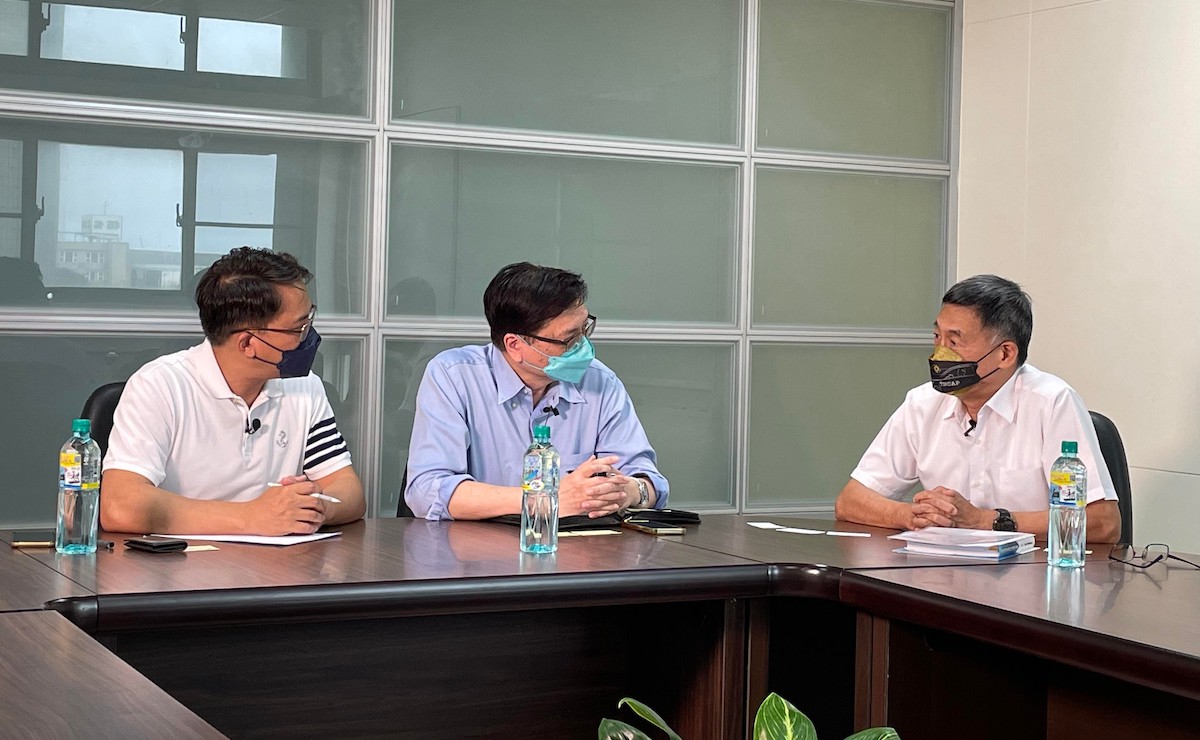Before getting registration plates and hitting the road, Taiwanese vehicles must pass four certifications: emission, noise, energy consumption, and safety. The two former categories have less importance after the advent of EVs, while energy consumption regulations will switch from fuel to electricity, and safety evaluations will be growingly vital. The Auto Future editorial team visited VSCC at Changhua Binhai Industrial Zone on the afternoon of Nov. 10 to discuss VSCC’s current operations and their certification adjustments for future auto products with CEO Wei-Guo Chou.
 Wei-Guo Chou (Right) , the CEO of VSCC, had an interview with Jeff Lee (Middle) and Seven Tseng (Left), the editors of Auto Future.
Wei-Guo Chou (Right) , the CEO of VSCC, had an interview with Jeff Lee (Middle) and Seven Tseng (Left), the editors of Auto Future.
Since its independence from ARTC in 2009, VSCC is under the Ministry of Transportation And Communications’ jurisdiction (while ARTC is under the Ministry of Economic Affairs). Since 2014, the organization has been gradually digitizing the safety evaluation process and certificates for the businesses’ convenience and even will release grace period for imported distributors/parallel importers’ last model-year inventories. All these efforts for the convenience of citizens and businesses allow the third-generation safety evaluation process to keep pace with the times while under safety regulations. Besides safety evaluations for individual components and car models before their launch, VSCC's responsibility includes well-known car inspection protocols from Motor Vehicle Offices and the vehicle recall system. Additionally, as major news in the auto circle, the Taiwan New Car Assessment Program, TNCAP, officially takes effect under VSCC’s guide. Equal to the world-renowned Euro NCAP and other countries’ NCAPs, the TNCAP runs stricter safety tests and evaluations than current regulations on market models (with official permits), such as “Taiwan’s first crash test” a few weeks ago conducted by the ARTC lab, commissioned by VSCC. The current TNCAP is based on the Euro NCAP 2019 and runs comprehensive tests and evaluations on the top eight best-selling car models (including domestic and imported ones) from last year. Because there are four destructive tests in total, each model needs four units to complete the evaluation process. Hence, VSCC will use up 32 cars on the TNCAP every year, raising a significant budget to provide Taiwanese consumers with more complete and just auto-safety information. Mr. Chou mentions that although Taiwan is the 13th country to implement NCAP worldwide, every NCAP’s test methods and benchmarks are different, so VSCC’s TNCAP will undergo a series of revisions based on its following years of experience and local needs to suit the Taiwanese market’s demands. Because of this, even imported models with overseas NCAP certifications will have to go through VSCC’s TNCAP. Aside from the TNCAP’s eight targeted best-selling models, domestic automakers or imported auto businesses can sign up for the program for identified models, with the process being random purchases by the Consumer’s Foundation’s mystery shopper appointed by VSCC. While the aforementioned process follows the SOP, its executory costs are awaiting the government’s ruling.
Regarding future intelligent V2X EVs, the current safety certifications require more updates, especially for the four topics below:
- Power batteries and electric control units. VSCC adopts UN’s ECE R100, a testing standard for electric power systems. Chou also pointed out the interface between electric control units and their related systems will be crucial to the safety of EVs, especially for novice manufacturers without vehicle development experience.
- Fully autonomous driving. Although autonomous driving isn’t fully implemented yet, the Ministry of Economic Affairs has established a “sandbox program” for related R&D units (ex. ARTC, ITRI, colleges, and universities) to conduct strictly regulated experimental test drives. VSCC will also plan function-sorted safety certification regulations for mass production based on the program and its experiment results, including compulsory examinations and automaker’s statements on their systems’ features and how to ensure safety. Moreover, the autonomous system evaluation will include revisions on driving behavior management and roadside unit IoT connectivity.
- OTA download verification function. In the future, car owners can download new functions from automakers via OTA after vehicle registrations. If the said function concerns driving safety, it’s beyond the safety certification’s reign before the model launch. For this, VSCC is planning a three-phase implementation process with the Ministry of Transportation and Communications. The first phase -till the end of next year- will adopt a filing-for-record system for automakers, while the second phase requires an audit system. For the third and final phase, a vehicle model certification system will require automakers to report any future OTA downloads regarding driving safety for inspection (which will be very hard to execute). The proposal will be submitted for review by the Ministry of Transportation and Communications at the end of the year and be swiftly promulgated.
- Cybersecurity. This year, VSCC signed the “Taiwan C-V2X Product certification and security insurance guideline establishments” with Chunghwa Telecom, of which VSCC is responsible for the V2X certification while Chunghwa Telecom is in charge of cybersecurity management. The collaboration will manage the highly crucial certification process of V2X and autonomous driving systems.
VSCC is the gatekeeper of certifying vehicles safety; compared to the industry-assisting ARTC, the organization plays a vastly different role. With the increasing importance of auto tech safety, VSCC takes on a heavy responsibility. In my opinion, VSCC’s prospects are more than the intriguing TNCAP and lie within more essential evaluation items in the future.